What is a Music Producer?
Quick Answer
A Music Producer contributes at least one of the following to the production of a song, EP, or album: Overview and organization, music performance, tracking, mixing and effects processing, and coaching and inspiration. Being a music producer means knowing how you can positively affect the music production process.
What is a Music Producer in Detail?
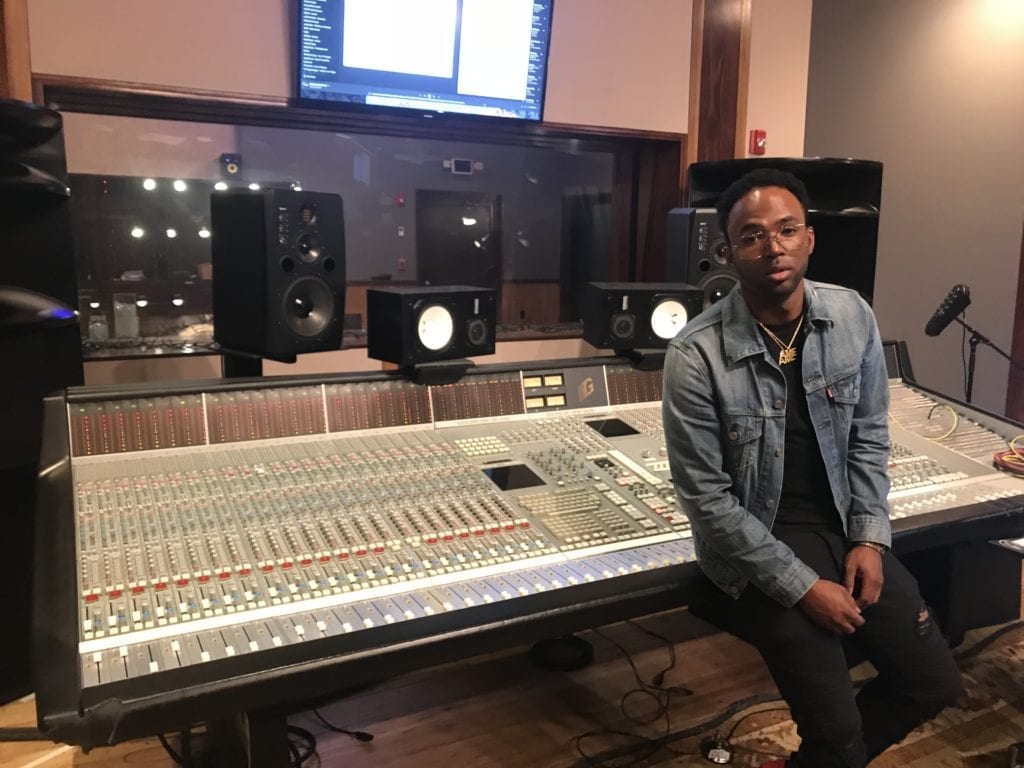
The title of "Music Producer" has changed a lot since its inception.
The term “Music Producer” has changed significantly over the years. Primarily, it’s a term that once meant only a relatively narrow set of responsibilities, and has now grown to include many different skill sets.
This can, of course, be confusing, considering that these diverse responsibilities are now under the umbrella of the title of “Producer.” Hopefully, with some persistence, we can better understand these different roles, and uncover how you can become a music producer in this day and age.
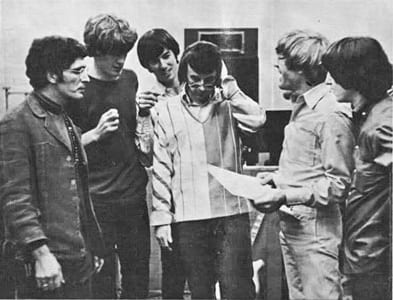
Music producers have changed from organizers to creative types.
We’ll be looking into some of the older meanings of the term Music Producer, as well as detail how the term has evolved to contain more roles. We’ll also be considering the value of the music producer, and explain how with some creativity and persistence, you can become a successful and unique producer.
Furthermore, we’ll take a look at the term “Super Producer,” and how some individuals are becoming skilled enough to take on nearly all aspects of the music production process.
If you’re someone who’s organizing, performing on, or engineering a record, and you’re planning the mastering portion of your project, send it to us here:
We’ll master one of your mixes and send you a free mastered sample of that mix.It’s a great way to find out if solely analog mastering is right for your project.
What Did “Music Producer” Used to Mean?
The term “Music Producer” used to be more specific - it referred to an individual that would hire the musicians and engineers, rent the studio, and pair all the right elements together to create a record. Their job was to put all the necessary pieces together to facilitate a record’s creation.
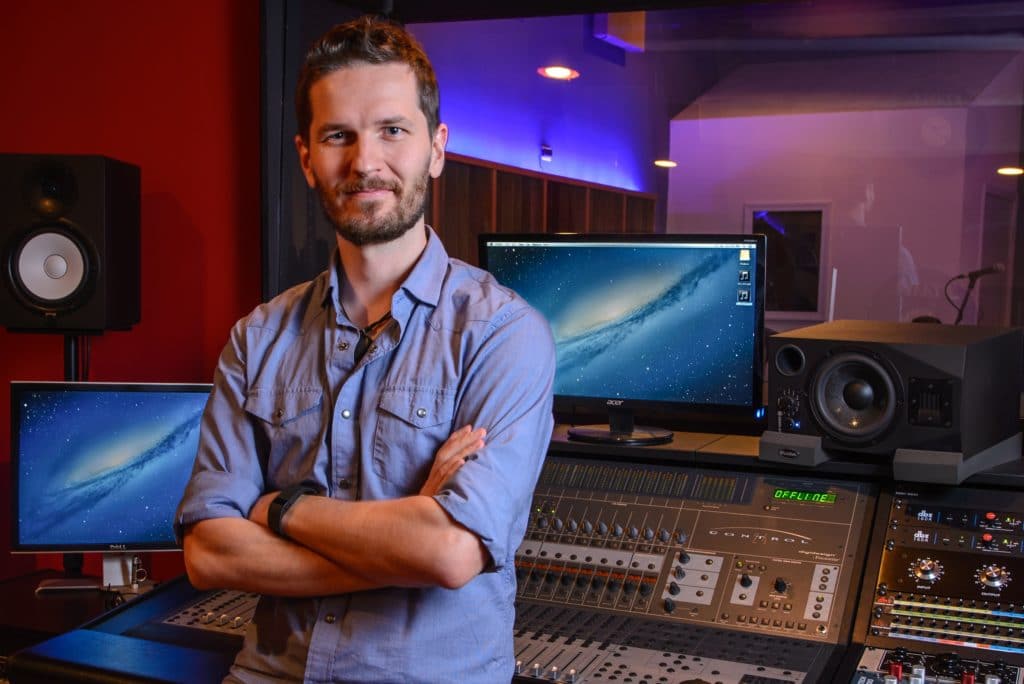
A music producer was once tasked with putting all the elements together, needed to make a record.
Typically, a record producer had been either an engineer or an artist, that with time, came to know various key players in the music industry. With these connections and the knowledge of who was particularly skilled at a certain job, these producers would organize these elements for the sake of making a great sounding record.
For example, they may notice that one tracking engineer is great at recording drums and bass, and that a particular studio has a great pre-delay, that emphasized the drums. They then might contact a session guitarist whom they’ve worked with and were impressed by.
From there, they work to get in touch with a talented mixing engineer, that’s worked on successful albums similar to that of the album their creating. And lastly, they shop around for mastering studios, looking for the best price for a good, and professional sound.
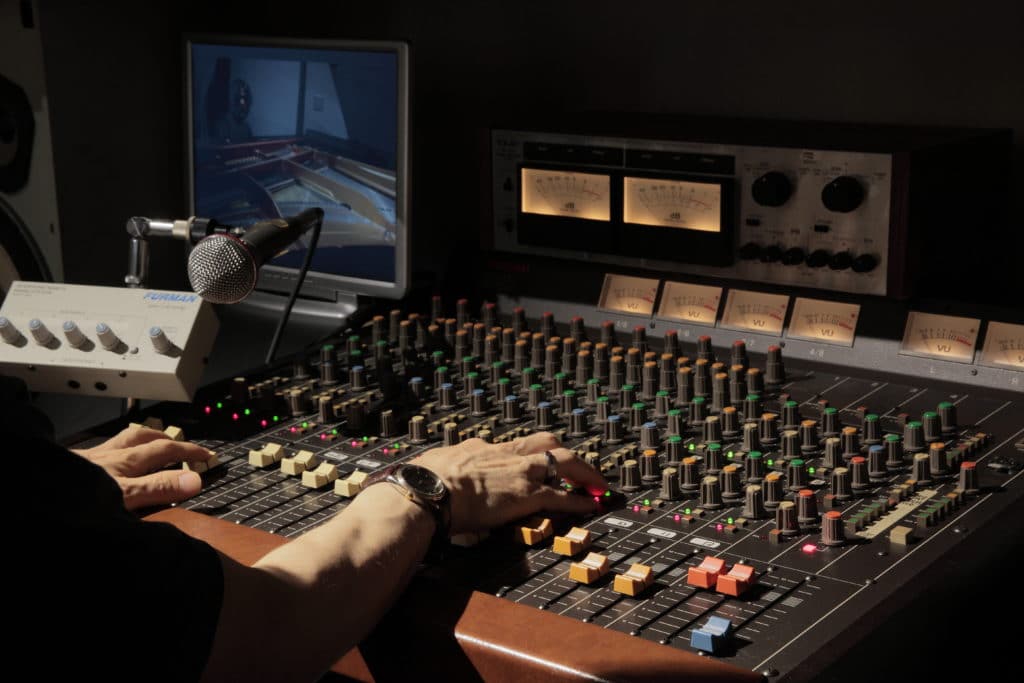
A music producer would find the recording, mixing and sometimes the mastering engineers for a record.
With all these key-players in place, they’d schedule the sessions, keep financial records, and a timeline to ensure that the album gets created at or below budget, and within a certain timeframe.
In this regard, a music producer was more like a record manager. Although there were some creative aspects behind choosing the right engineers and musicians, their work was more pragmatic, and centered on the logistics of completing an album.

Music producers were once tasked with budgeting a record, or at least ensuring it stays on budget.
Often times, these producers were hired by labels to ensure that their money was being properly spent and that an album would be released on schedule. Today, this job still exists, but it isn’t as often associated with the term “Music Producer.”
If you’re looking to become a music producer, this is still a valuable skill to have. It’s not often that someone knows all the elements needed to make an album, let alone be able to put all of those elements together.
Keep note of any artist or engineer you find particularly talented. Perhaps you’ll be the one that facilitates these seemingly unconnected people working together on a project.
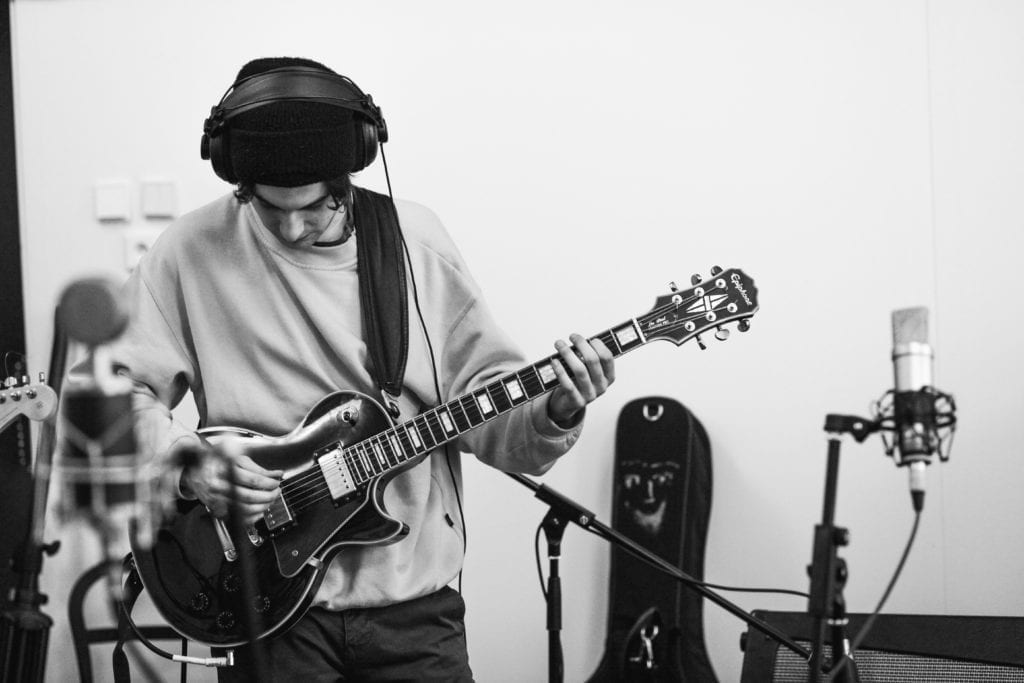
A traditional music producer would keep note of any good performer or engineer they came across.
How Did Music Producers Start Influencing Music Production?
With an ear for music, and knowledge of how to put all the right players together, Music Producers began to start altering the sound of records - a skill that soon expanded to the recording and engineering process. Music Producers implemented new recording techniques that changed the face of popular music.
Perhaps one of the most famous examples of this is the work of Phil Spector. His implementation of the “Wall of Sound” changed how music was recorded, and perceived. Soon, small bands whose records once consisted of their relative instruments, were layering stacks of guitars, drums, background vocals and accompanied by an orchestra.
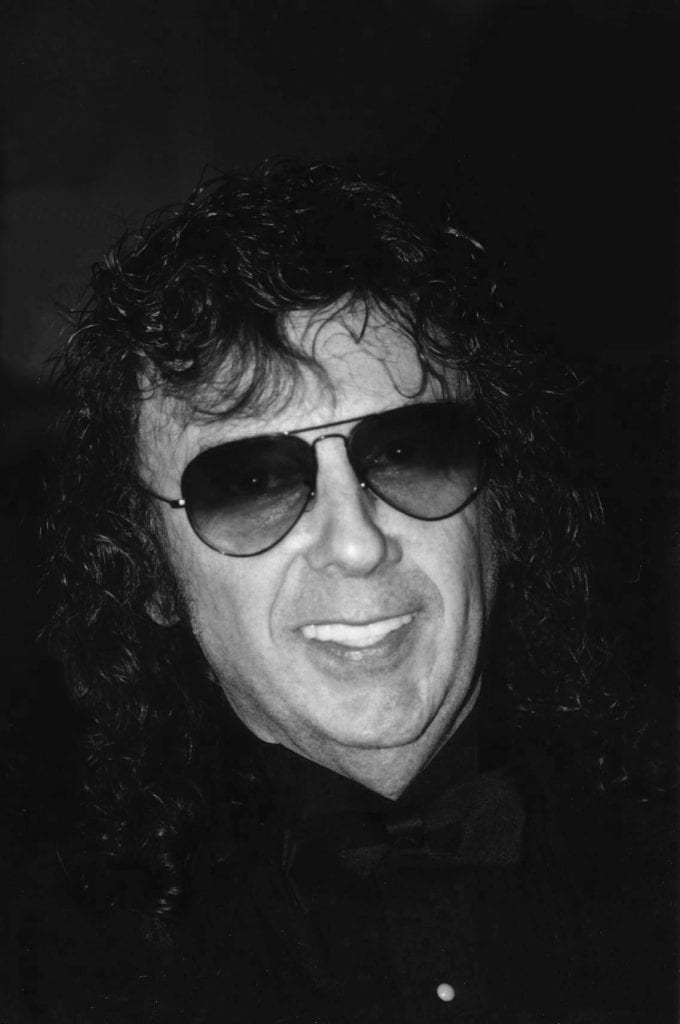
Phil Spector was one of the first music producers to implement creative recording techniques.
The idea being that this busy instrumentation would fill all frequencies, and create a larger than life sound - one that could augment the feeling of the song from that of a traditional pop recording, to something anthemic.
With that said, producers began to call shots with the instrumentation, how it was performed, and the composition behind it. In order to create the sound they wished to have recorded, they needed to control more aspects of the recording process than before. This shifted the role of a producer from a general organizer, to an active composer.
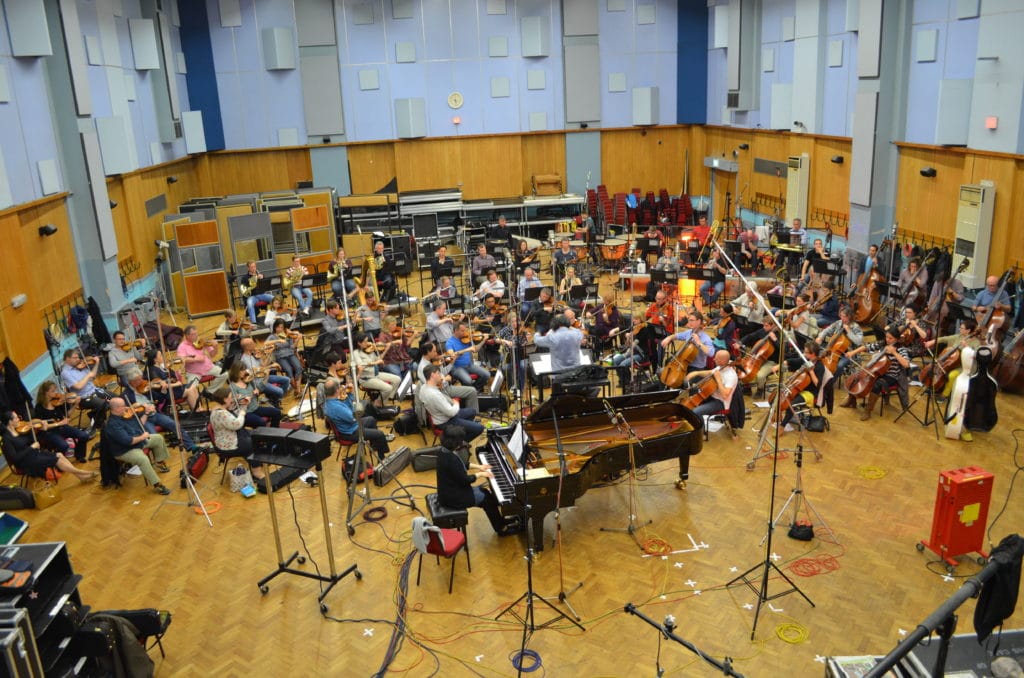
The wall of sound is characterized by larger than life instrumentation.
In addition, producers soon became accustomed with the equipment used to record music. Because they were planning the composition, they needed to know the technical limitations of what they were working with. For example, if a 4-track recorder was the limit for the number of tracks an engineer could record, a producer would need to keep this, as well as the limitations of a summing mixer in mind, if they wished to accomplish their desired sound.
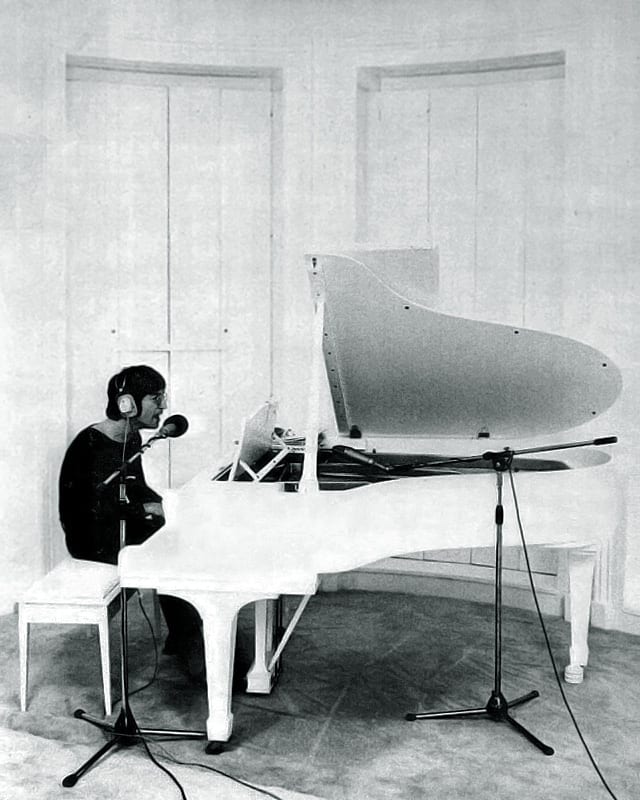
Phil Spector revolutionized the sound of the Beatles, and went on the work with John Lennon.
This isn’t to say that music producers were tracking and mixing engineers, but that the gap between engineer and music producer was slowly closing. It was only a matter of time before an engineer took on the role of "music producer."
If you’re a music producer looking to learn more about the mixing side of things, check out some of our blog posts here:
We have a great deal of valuable information on the topic.
How Did the Recording Engineer Become a Music Producer?
Slowly but surely, engineers learned more than just how to operate soundboards. They learned music theory, developed an ear for good tones and progressions, and soon became an integral part of the music creation process.
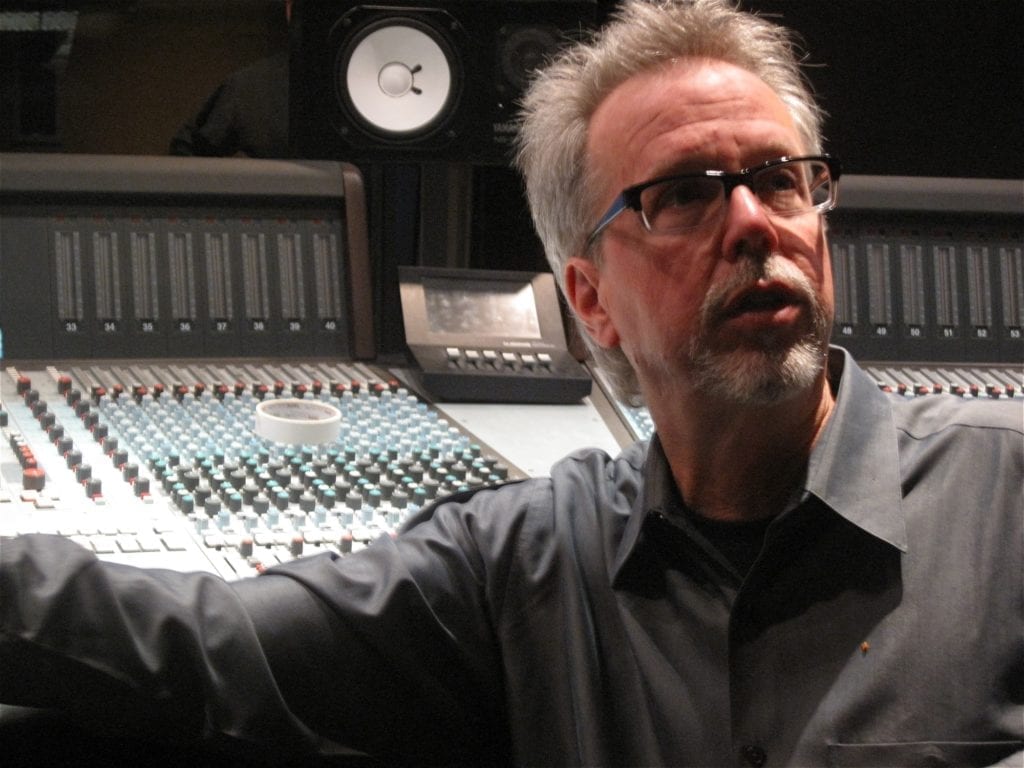
Soon engineers also joined in on the creative aspects of recording music.
One of the better examples of this transformation from solely that of an engineer, to engineer and music producer, can be noticed when looking at the legendary Tom Dowd.
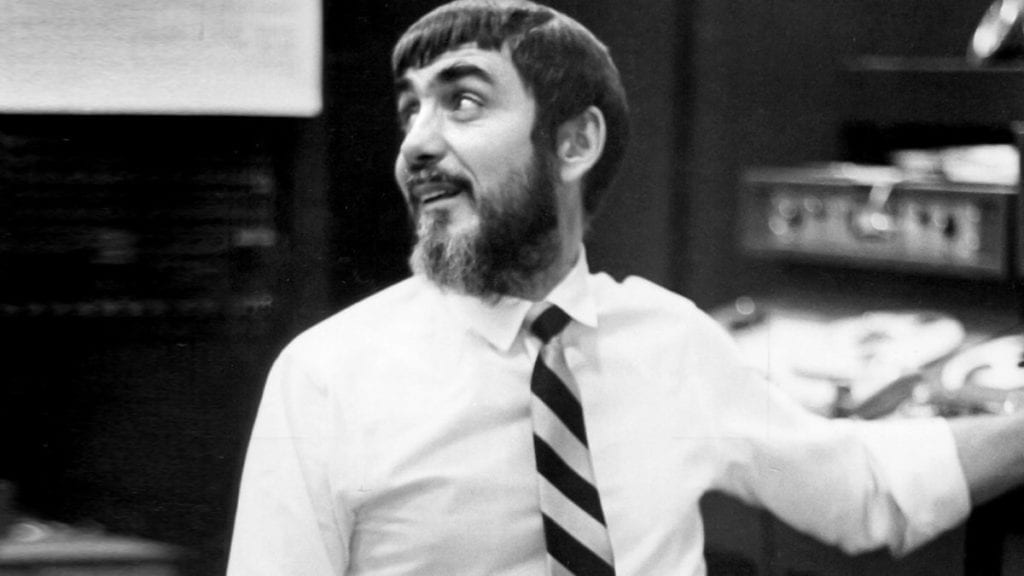
Tom Dowd was one of the first engineers to add his creative input during the recording process.
From working as a nuclear physicist on the Manhattan Project, to popularizing 8-track recording in studios and making channel faders the standard (as opposed to rotary knobs), Tom Dowd can be seen as an eclectic and versatile individual.
It only makes sense that he wouldn’t be comfortable limiting himself to the role of an engineer during the music-making process. After working on a multitude of hit records, and landing a job as an engineer with Atlantic records, Dowd soon learned the music-making craft and became fluent in music theory and the discourse surrounding it.
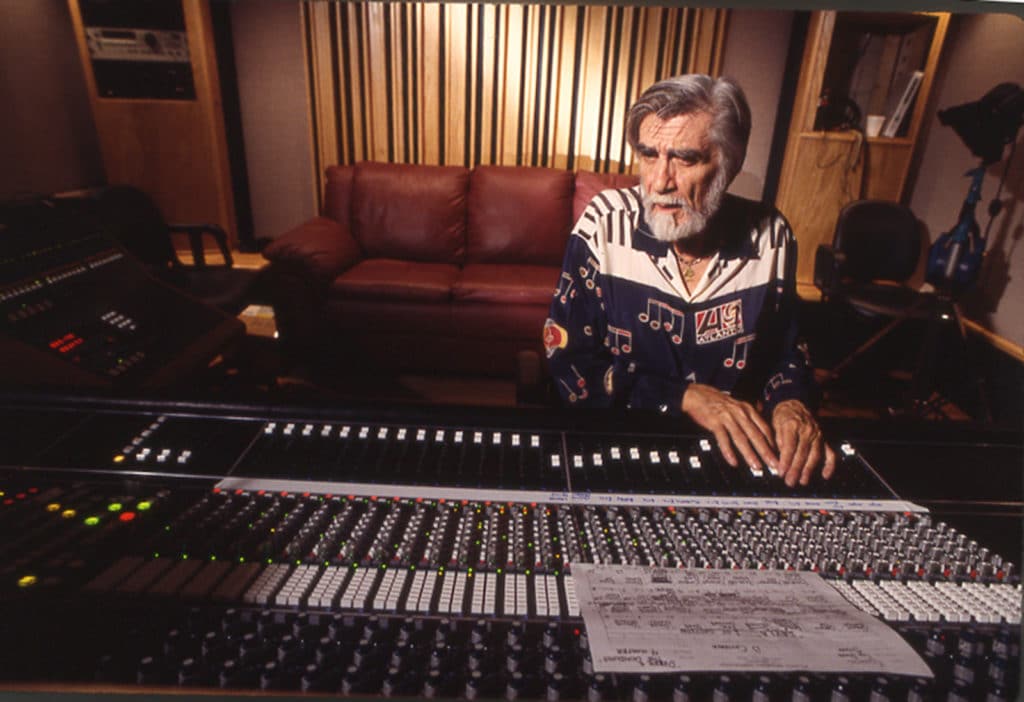
Tom Dowd influenced engineers to think more musically, and involve themselves in the creative side of engineering.
With this new skill set, he was able to communicate his musical ideas with the musicians with which he worked. Soon he could suggest chord structures, tempo changes, and on occasion small changes to lyrics to better suit his artistic vision.
Tom Dowd’s role as an engineer turned producer, laid the foundation for our current understanding of the term “music producer.” This marked the start of engineers having a say in the music creation process. They were no longer simply board operators, solely responsible for recording and engineering; they could become integral parts of the music-making process.

Kanye West went from Engineer to Beatmaker/Producer, to a fully-fledged artist,
What we’ve learned from both Tom Dowd and Phil Spector, and many other talented music producers, is that any innovation occurring to the title and responsibilities of “music producer’ has come from an individual that wished to expand their role, and to see their creative visions come into fruition. They were engineers, managers, and musicians that wanted to become more involved with the creative or technical aspects of making music.
How Did the Artist Become a Music Producer?
By now we can see how the titled of music producer has been blurred by many creative individuals taking on multiple roles. Another example of this, is when artists start controlling and conducting their sessions. No longer are they simply songwriters and performers, they’re composers, conductors, and all-around producers.
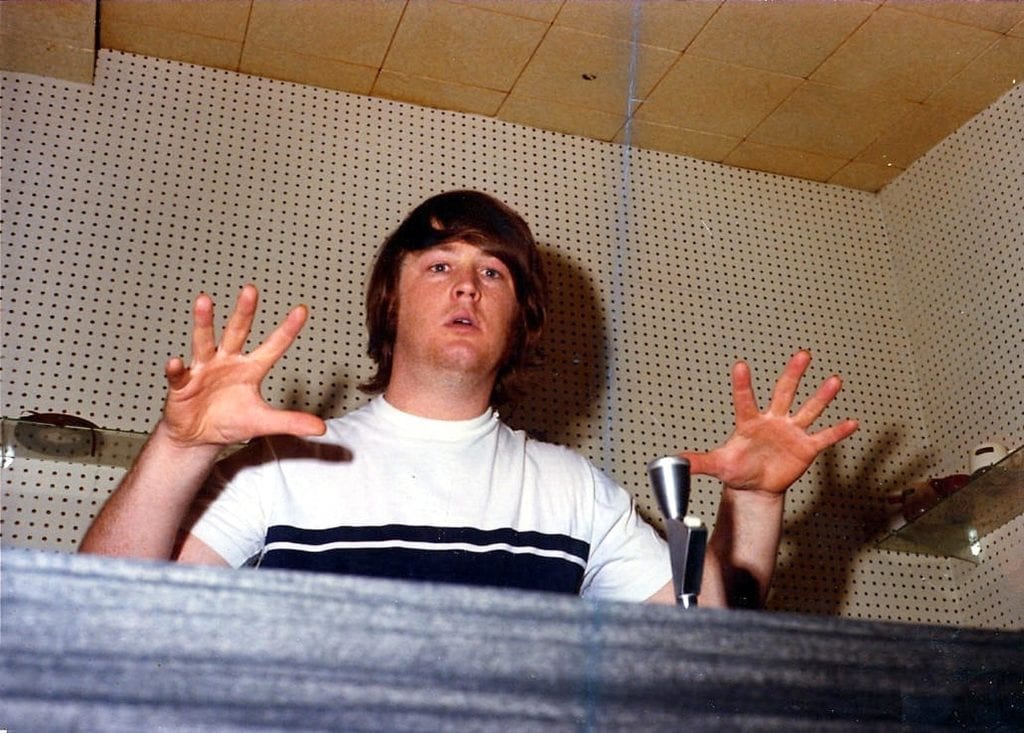
Brian Wilson showed the benefits of letting talented artists take control of their projects.
The best example of this occurring is with the work of Brian Wilson on the highly influential masterpiece, Pet Sounds. Brian wrote, composed, conducted, performed on, and even had a role in engineering this passion project. He showed that with the right knowledge, an artist can expand beyond their traditional role, to create something significant.
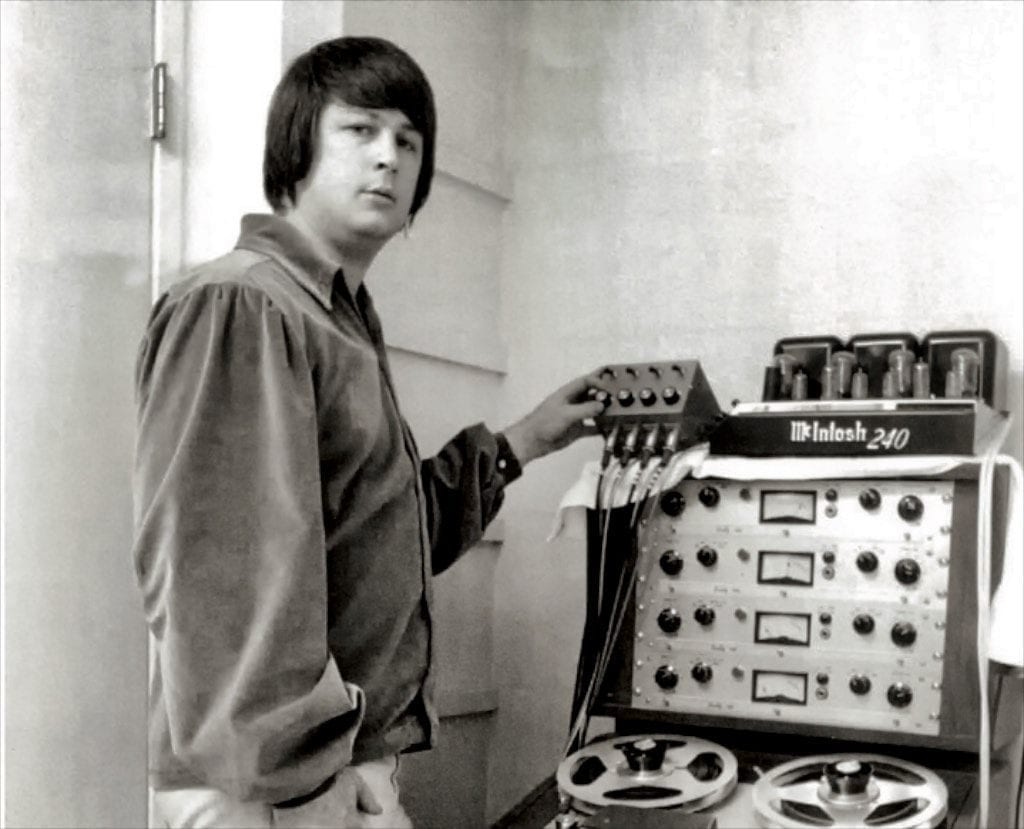
Brian Wilson also understood the recording side of things.
Today, many artists follow suit, as they take a larger role in creating the majority of the instrumentation on their records. The artist formerly known as Prince, and Beck are two good examples of how Brian’s work influenced other artist-producers.
Prince would, and Beck continues to create multiple layers of instrumentation and vocal performances, instead of hiring a band or outsourcing the composing process to another producer or composer.

With Wilson as inspiration, Beck writes and records multiple instruments, as well as composed and arranged his albums.
Once again, we can see how a few talented individuals changed how we perceive the role of music producer, what it can mean, and who can be one.

Prince was known to spend the night in the studio, experimenting with effects and layering instrumentation.
What Other Roles Can a Music Producer Have?
Music producers don’t always need to create the music themselves. In fact, some incredibly successful music producers barely know how to play an instrument.
These producers are responsible not for composition, performance, or engineering, but with coaxing the best performance from an artist. They take it upon themselves to evoke the necessary emotion or performance from an artist or musician, in an effort to create a great sounding recording.

Rick Rubin is considered more of a coach than a musician. His approach has led to some incredibly popular and well-received albums.
For the producer-guru Rick Rubin, this might mean inviting you to record in his California mansion, where you can focus on your art, away from the distractions of the outside world.
Or for producer Ross Robinson, this might mean throwing potted plants are your artists during a performance to capture the angriest sounding performance possible, as he did during Slipknot’s debut album (this tactic might not work as well for indie or chill-wave music).
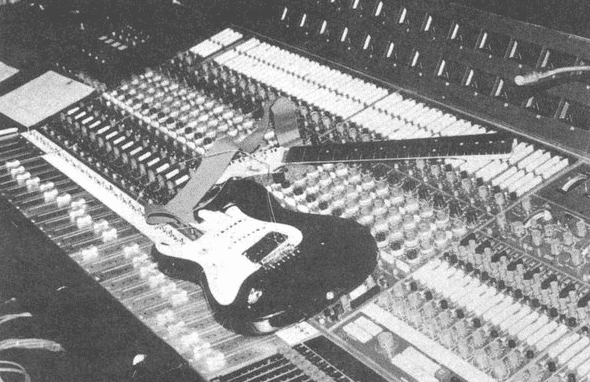
Sometimes music producers' main job is to evoke emotion from their musicians.
The point being, some producers have a stranger, less orthodox way of creating the best records possible. Many have created careers from their less conventional ways of approaching an album - ones that may be a bit harder to understand.
Regardless, they are still certainly music producers, despite not fitting into a traditional category or being directly involved with the production, performance, or engineering side of things.
What is a Super Producer?
A super-producer is a music producer that can take on the majority of roles other music producers do, and do so incredibly well. Super producers are artists, tracking, mixing, and mastering engineers, composers, and often play the majority if not the entirety of the instruments on their record.
Although common knowledge would say that no one individual can accomplish all this, we have recently seen the emerging popularity of this form of music creation. It may be due to the widespread availability of music creation technology and virtual instruments, but regardless of reason or cause, some individuals are trying to take on as many roles as possible.

Trent Reznor learned how to write, arrange and engineer his records. A skill set that has carried him far in his career.
This new super-producer role arguably began with Trent Reznor, founder of the band Nine Inch Nails. Reznor actively writes, engineers, performs and composes his records. His ability to take on so many roles has led to great success in other musical endeavors such as film scoring, and creating music for video games, as well as other entertainment products.

Kevin Parker is another multi-instrumentalist that takes the production of his records in his own hands.
Similarly, Kevin Parker, founder and primary member of the psych-rock group Tame Impala, started the group by writing, performing and assisting in the tracking, composing, mixing and mastering of his first album. Since then, he still performs the majority if not the entirety of his album’s instrumentation, as well as tracks and mixes his records.
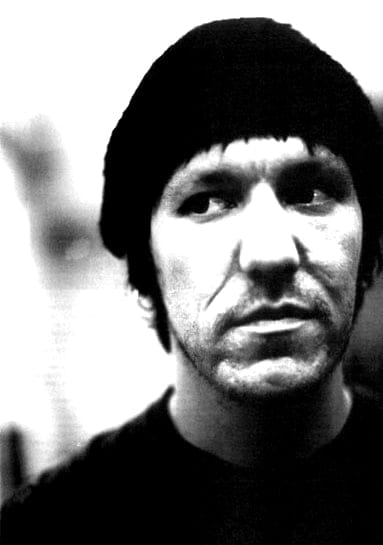
Another "Super-producer" is Elliott Smith. He wrote, tracked, and arranged the entirety of his first 2 albums. He also played the majority of the instrumentation on his other albums.
This is a significant divergence from the way records were made in the past, as the majority of the jobs are being handled by one individual, as opposed to multiple jobs being delineated to many separate engineers, conductors, musicians and so on.
All this to say, the lines that one dictated who did what in the music industry have been crossed in a seemingly irrevocable way.
If you’re making a song, and you want to know all the steps needed for creating and releasing your music, here is a blog post exactly on the topic:
It can help you understand everything that goes into the music-making process.
How Can You Become a Music Producer?
This is a difficult question, as there is no one clear-cut answer. Just as the term “music producer,” and the responsibilities associated with it are incredibly complex and varied, so too are the means by which to become one.
You can become a musician or associate with musicians. Or perhaps, you can become an engineer and slowly become acclimated with making music. In all honesty, there are a lot of possibilities.

If you'd like to be a music producer, and become more familiar with the writing side, perhaps start with learning an instrument.
But maybe the best way to become the type of music producer you wish to be, is to choose a specific path and pursue it. If you know you only want to inspire or coach performing artists into giving the best performances, then work towards that - learn how to inspire, coach, and evoke emotion from the artists with which you work.
Or if you’re interested in becoming an engineer that can make informed and valued suggestions to artists, first try to record songs with various artists, notice what makes an album sound good, and start making suggestions during the recording process.

If you'd like to be more of an engineering producer, start by recording, mixing and mastering some songs.
And if you intend to become a super-producer, start learning as much as you can about recording, writing, and all other aspects of the music-making process. Essentially, try to write, record and engineer your records by yourself.

If you're trying to become a super-producer, learn as many music creation skills as possible.
There is no one way to become a music producer, because there is no one definitive role a music producer has. Just know that the process of becoming one may be difficult, and will require your full effort.
If learning how to master music is part of becoming a music producer for you, read our blog post on the topic.It’s full of great information that can help you better understand the mastering process:
Conclusion
Understanding what a music producer is means understanding everything a music producer can be. Throughout the history of the professional, a lot has changed.
There have been a handful of particularly creative and arguably somewhat defiant engineers, artists, and producers that wanted to branch out beyond their traditional and expected roles.
Because of them, and the diversity that exists within the profession today, that we understand the term “music producer” to mean something slightly different from producer to producer.
That being said, if you're a producer or wanting to become one, and you have a mix that you need mastered, send it to us here:
We'll master it for you and send you a free mastered sample.
What type of producer do you want to be?




